|
|
|
Sort Order |
|
|
|
Items / Page
|
|
|
|
|
|
|
| Srl | Item |
| 1 |
ID:
161666
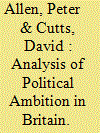

|
|
|
|
|
| Summary/Abstract |
Representative democracies require sufficient numbers of citizens to put themselves forward as candidates for political office. Existing studies have shown that political institutions are not representative of the population as a whole, suggesting that political ambition is not evenly distributed across all potential candidates. We discuss evidence from the first systematic study of political ambition in Britain, examining the question of who is interested in putting themselves forward for political office. We find patterns in the distribution of political ambition that help to explain why British political institutions do not look like the British people as a whole and include a gender gap, a social class gap, an education gap, a north–south divide, and a personality gap. We discuss the implications of our findings for political parties, arguing that they need to adjust practices of candidate recruitment in such a way that minimises the effects of these biases.
|
|
|
|
|
|
|
|
|
|
|
|
|
|
|
|
| 2 |
ID:
172390
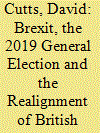

|
|
|
|
|
| Summary/Abstract |
The outcome of the 2019 general election—a resounding Conservative majority and an unprecedented defeat for Labour—delivered a decisive electoral verdict for the first time in recent years following a period where British politics has been characterised by instability and indecision. In this article, we draw on aggregate‐level data to conduct an initial exploration of the vote. What was the impact of Brexit on the 2019 general election result? How far has Brexit reshaped electoral politics? Was 2019 a ‘realignment election’? And, if so, what are the implications? With a focus on England and Wales we show that, although the Conservatives made gains deep into Labour’s working class heartlands, these gains have been a long time coming, reflected in Labour’s weakening relationship with working class Britain. As such, 2019 is not a critical election but a continuation of longer‐term trends of dealignment and realignment in British politics.
|
|
|
|
|
|
|
|
|
|
|
|
|
|
|
|
| 3 |
ID:
105864
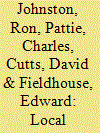

|
|
|
|
|
| Publication |
2011.
|
| Summary/Abstract |
The regulation of party political funding and expenditure in the United Kingdom is an issue of continuing political and public debate. Campaign expenditure by candidates has been regulated since the late nineteenth century, but this has applied only during the short campaign period between the dissolution of Parliament and polling day. Concerns have been raised about earlier expenditure levels, but these were not regulated until legislation in 2009 which limits the amount that candidates can spend in the months prior to Parliament's dissolution-in 2010 this covered the period between 1 January and 15 April: the election was held on 6 May. The Electoral Commission has released information on all candidates who made a return of their expenditure during both periods. This article provides descriptive data on those amounts, by party and type of constituency, plus analyses which show that the more that a party spent the better its performance at the polls.
|
|
|
|
|
|
|
|
|
|
|
|
|
|
|
|
| 4 |
ID:
168754
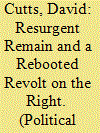

|
|
|
|
|
| Summary/Abstract |
The 2019 European Parliament (EP) election took place against the backdrop of the vote for Brexit and the failure of Parliament to agree on a withdrawal agreement. Nigel Farage’s new Brexit Party topped the poll and the pro‐Remain Liberal Democrats, which called for a second referendum on EU membership, returned from electoral obscurity to take second place, while other pro‐Remain parties similarly performed well. In sharp contrast, the two main parties, Labour and the Conservatives, recorded their lowest combined vote share since they became the main representatives of the two‐party system. In this article, we draw on aggregate‐level data to explore what happened at the 2019 EP election in Great Britain. Our evidence suggests Labour suffered from a ‘pincer movement’, losing support in its mainly white, working class ‘left behind’ heartlands but also in younger cosmopolitan areas where Labour had polled strongly at the 2017 general election. Support for the new Brexit Party increased more significantly in ‘left behind’ communities, which had given strong support to Leave at the 2016 referendum, suggesting that national populists capitalised on Labour’s woes. The Conservatives haemorrhaged support in affluent, older retirement areas but largely at the expense of the resurgent Liberal Democrats, with the latter surging in Remain areas and where the Conservatives are traditionally strong, though not in areas with younger electorates where the party made so much ground prior to the 2010–2015 coalition government. Lastly, turnout increased overall compared with 2014, but individuals living in Leave areas were less motivated to vote. Overall, our findings suggest that those living in Remain areas were more driven to express their discontent with the Brexit process and more inclined to support parties that offer a second referendum on Britain’s EU membership.
|
|
|
|
|
|
|
|
|
|
|
|
|
|
|
|
| 5 |
ID:
111505
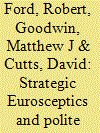

|
|
|
|
|
| Publication |
2012.
|
| Summary/Abstract |
While Euroscepticism is the most important driver of United Kingdom Independence Party (UKIP) support, other attitudinal drivers - namely dissatisfaction towards mainstream parties and xenophobia - are also important. Examining vote-switching between first- and second-order elections evidence is found of a distinction between two types of supporter: more affluent and middle-class 'strategic defectors' from the mainstream Conservative Party who support UKIP to register their Euroscepticism, and more economically marginal and politically disaffected 'core loyalists' who are attracted to UKIP by its anti-immigration rhetoric and populist anti-establishment strategy. UKIP also succeeds in attracting core support from groups such as women who have traditionally rejected extreme right parties such as the British National Party (BNP). This suggests that UKIP is well positioned to recruit a broader and more enduring base of support than the BNP.
|
|
|
|
|
|
|
|
|
|
|
|
|
|
|
|
|
|
|
|
|